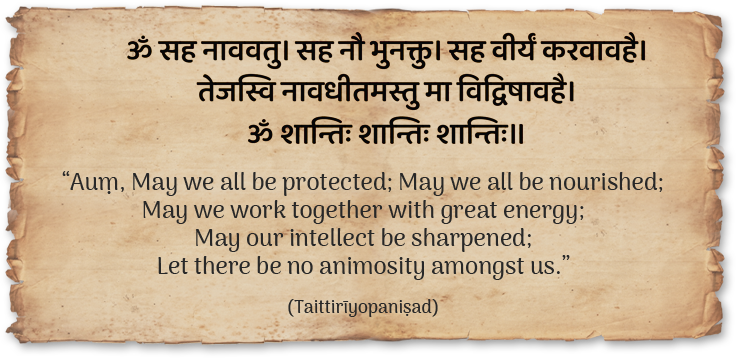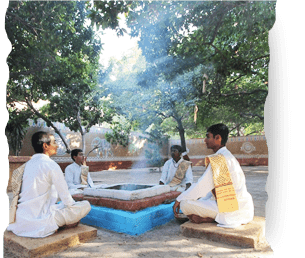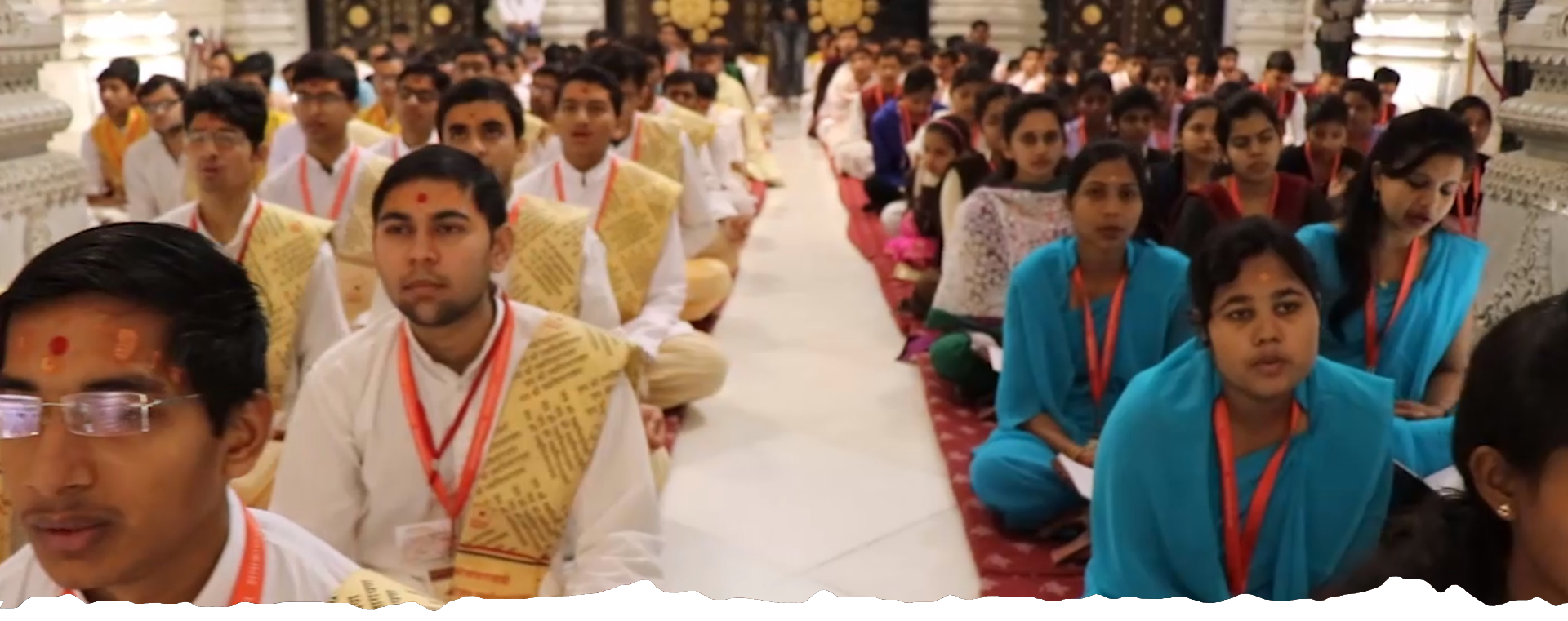BAPS Swaminarayan Research is dedicated to advancing quality research, learning, and expression in all forms of academic scholarship. Through our various educational initiatives, we seek to promote the highest level of academic excellence in all branches of studies. We believe that providing opportunities for value-based instruction, innovative research, creative expression, mutual discussion, and social service will inspire quality, original, productive, and responsible scholarship. Committed to fostering an intellectual tradition built upon a strong foundation of values, we strive to advance academic thought throughout all its landscapes and create sustainable opportunities for holistic growth.
About
Education

The purity of knowledge lies in its universal relevance and the selfless act of its transmission. Learning in all its forms is forever illuminating and liberating. It actuates change and realizes the potential of all its receivers. What greater gift can be bestowed than knowledge itself? Committed towards gifting knowledge, we at BAPS Swaminarayan Research are invested in facilitating higher education.
Research

Education reaches its greatest fulfillment through insightful research. By encouraging and facilitating research, our institutes strive to ever expand the domain of knowledge. Whether it is descriptive, correlative, analytical, or experimental, research paves the way forward in all disciples. It promotes systematic creation, analysis, and evaluation of thought, which in turn, drives awareness, growth, and implementation.
Discussion

Discussion is a process of communication in which ideas are exchanged. It is an integral tool for both the learning process and the development and expression of rigorous academic research. By encouraging respectful, honest, and insightful discussions, we seek to enhance the quality of all aspects of education and study. We advocate that promoting healthy discussions has many benefits and is a necessary feature of modern academic development.
Expression

In addition to focusing on educational and research initiatives, we emphasize the significance of communicating learning through presentation and the production of creative expressions. These creations serve to communicate ideas, develop and authenticate them, and contribute towards the growth of its presenters.
Service

Service is the heart of education. It provides students, educators, and researchers the opportunity to become active members of the community, change lives, and create a lasting, positive impact on society. After all, what is the meaning of education if it does not enlighten, inspire change, and make the world a better place? We at BAPS Swaminarayan Research understand the crucial role that service plays in the lives of our members and the communities in which they operate. For this reason, we encourage our students, faculty, researchers to become productive, thoughtful citizens and inspirational leaders in their communities and professions.
Principles of Excellence
The foundation of the BAPS Swaminarayan Research’s continued success lies in its emphasis on rigorous study and research built upon a foundation of core values. By nurturing jñāna (knowledge), satya (truthfulness), dayā (compassion), ahimsā (non-violence), asteya (honesty), aparigraha (renunciation), and dharma (righteous living), all of our activities seek to further value-based learning in all its diverse forms.

Jñāna (Applied Knowledge)
At BAPS Swaminarayan Research we seek to inspire applied knowledge that allows students and researchers to employ information, tools, and techniques to various situations and contexts.

Satya (Truthfulness)
When learning becomes imbibed with truthfulness, in not only one’s actions and speech but also with oneself, feelings of contentment and purity guide learning.

Dayā (Compassion)
Dayā seeks to instill empathy and inspire action to mitigate the sorrow and difficulties of others. Motivated through such compassion, our students and researchers are encouraged to understand others, appreciate and respect their beliefs and identities, and seek to pursue learning to help others.

Ahiṃsā (Non-violence)
Through ahiṃsā—the precept of abstaining from causing harm to others through one’s actions, speech, or thoughts—our students learn to value and cherish life in all its diverse forms.

Asteya (Honesty)
Asteya is the virtue of abstaining from all forms of theft. At BAPS Swaminarayan Research we encourage our members to be honest in all their ventures, both academic and personal.

Aparigraha (Renunciation)
When learning becomes focused through aparigraha—the willful sacrifice of extraneous motives and distractions—it takes upon remarkable speed and progress.

Dharma (Righteous Living)
We at BAPS Swaminarayan Research believe that diligent study substantiated with righteous living and moral fortitude helps foster an environment that promotes responsible and conscientious growth.
By integrating these principles with learning, research, and diverse forms of expression,
BAPS Swaminarayan Research and its institutes excel in training competent, well-informed, and responsible leaders.
Principles of Excellence
The foundation of the BAPS Swaminarayan Research’s continued success lies in its emphasis on rigorous study and research built upon a foundation of core values. Through jñāna (knowledge), satya (truthfulness), dayā (compassion), ahimsā (non-violence), asteya (honesty), aparigraha (renunciation), and dharma (righteous living), all of our activities seek to further learning in all of its diverse forms.

Jñāna (Applied Knowledge)
At BAPS Swaminarayan Research we seek to inspire applied knowledge that allows students and researchers to employ information, tools, and techniques to various situations and contexts.

Satya (Truthfulness)
When learning becomes imbibed with truthfulness, in not only one’s actions and speech but also with oneself, feelings of contentment and purity guide learning

Dayā (Compassion)
Dayā seeks to instill empathy and inspire action to mitigate the sorrow and difficulties of others. Motivated through such compassion, our students and researchers are encouraged to understand others, appreciate and respect their beliefs and identities, and seek to pursue learning to help others.

Ahiṃsā (Non-violence)
Through ahiṃsā—the precept of abstaining from causing harm to others through one’s actions, speech, or thoughts—our students learn to value and cherish life in all its diverse forms.

Asteya (Honesty)
Asteya is the virtue of abstaining from all forms of theft. At BAPS Swaminarayan Research we encourage our members to be honest in all their ventures, both academic or personal.

Aparigraha (Renunciation)
When learning becomes focused through aparigraha—the willful sacrifice of extraneous motives and distractions—it takes upon remarkable speed and progress.

Dharma (Righteous Living)
We at BAPS Swaminarayan Research believe that diligent study substantiated with righteous living and moral fortitude helps foster an environment that promotes responsible and conscientious growth.
By integrating these principles with learning, research, and diverse forms of expression,
BAPS Swaminarayan Research and its institutes excel in training competent, well-informed, and responsible leaders.
Distinct Yet One
While all institutes within BAPS Swaminarayan Research are engaged in all the above aspects of education, each possesses unique characteristics and is committed in different ways. A broad and inclusive perspective of the institutes reveals that each is uniquely oriented according to its geographic location, bilateral relationships with affiliate institutions, and specific priorities.
BAPS Swaminarayan Research Institute
Swaminarayan Akshardham
New Delhi
The BAPS Swaminarayan Research Institute is positioned within Swaminarayan Akshardham in New Delhi and has a prominent national and international audience. Its emphasis focuses on learning, research, publication, and service to address needs and communities at the national and international level.
AARSH
Swaminarayan Akshardham
Gandhinagar, Gujarat
AARSH at Swaminarayan Akshardham in Gandhinagar addresses domestic audiences and communities. Its distinct focus on manuscriptology, history, darśanic reflection, and interdisciplinary studies makes it a home for students and researchers interested in these fields of study.
BAPS Swaminarayan Sanskrit Mahavidyalay
BAPS Swaminarayan Mandir
Sarangpur, Gujarat
Taking a more traditional approach towards education, the BAPS Swaminarayan Sanskrit Mahavidyalay in Sarangpur, Gujarat specializes in the study of philosophy, literature, sacred texts, and languages, including Sanskrit, Hindi, Gujarati, and English.
Such broad differences, however, do not imply that our institutes exclusively engage in their respective fields of study or do so independently of one another. Instead, all institutes work collectively to complement each other’s disciplinary expertise. Each institute’s unique features and commitments are only possible by the support provided by the others.
Positioning these different institutes under one umbrella offers a unique advantage that allows for a comprehensive multi-disciplinary, multi-faith, and multi-cultural engagement. It also allows for learning and research to occur with greater focus and depth and broadens our scope of interest, enabling us to not only link with a wider range of partners and communities, but also make a broader impact in scholarship, the community, and the world.
Such broad differences, however, do not imply that our institutes exclusively engage in their respective fields of study or do so independently of one another. Instead, all institutes work collectively to complement each other’s disciplinary expertise. Each institute’s unique features and commitments are only possible by the support provided by the others. Positioning these different institutes under one umbrella offers a unique advantage that allows for a comprehensive multi-disciplinary, multi-faith, and multi-cultural engagement. It also allows for learning and research to occur with greater focus and depth and broadens our scope of interest, enabling us to not only link with a wider range of partners and communities, but also make a broader impact in scholarship, the community, and the world.




